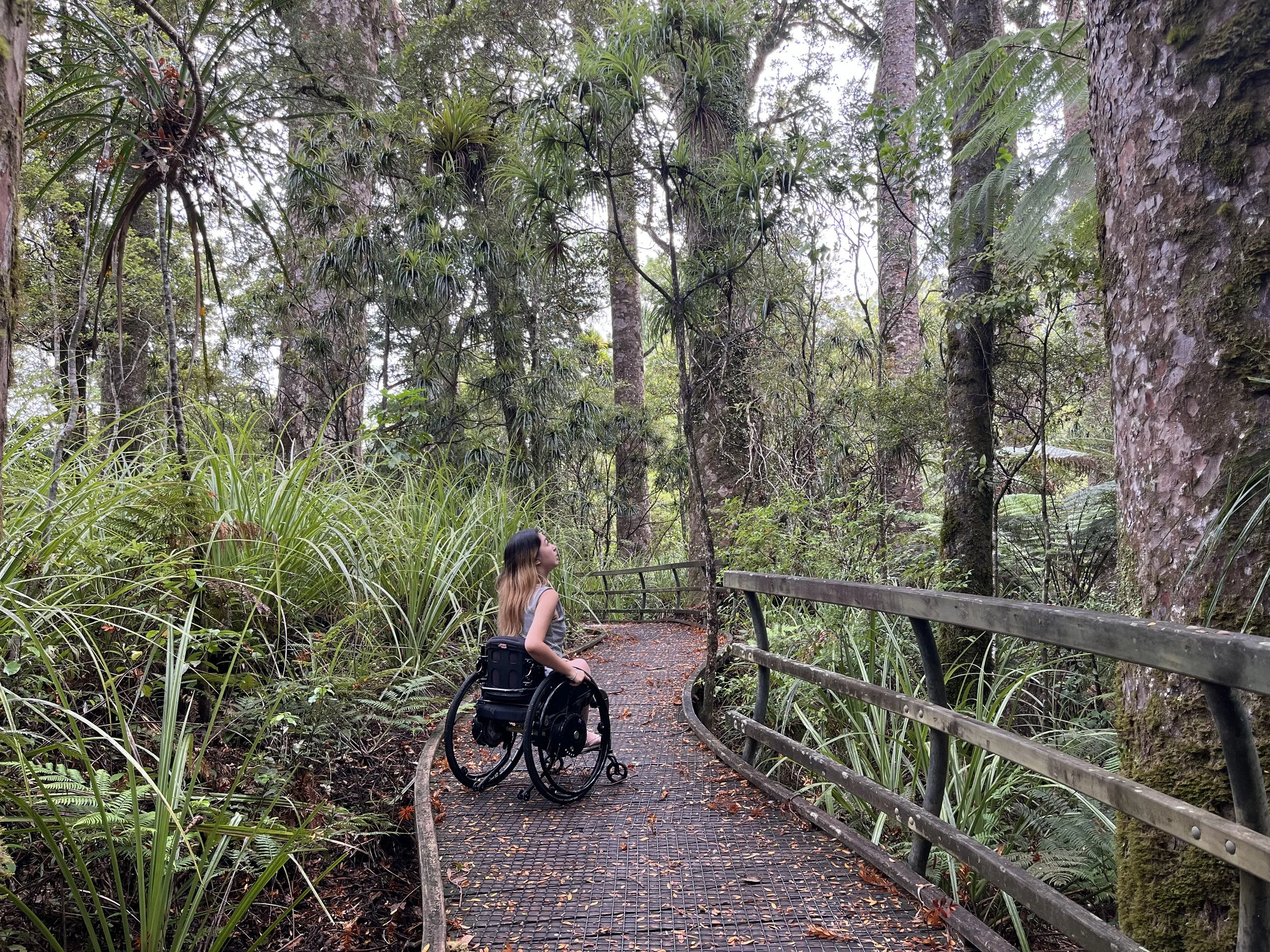Health, wellness, and disability: How disabled people navigate the wellbeing industry
People with disabilities want to participate in all aspects of life, work, play, social, fitness. We are multifaceted, and we want to be involved in things that non-disabled people want to as well. It's just finding ways to make it work, because it is possible. A little bit of creative thinking, and making yourself available to learning.
Back in November 2021, I resigned from my job after feeling burnt out and overwhelmed by the world around me. The simplest of tasks were taking all my energy and I was in no state to serve myself or the people around me. I knew I needed to put my physical and mental health first, so I started looking into what I needed to do. Instagram’s world of wellbeing suggested I try nature walks, exercise, yoga, and specific meditation techniques. These are all great techniques backed by science. The problem though, was that none of them were accessible to me as someone who uses a wheelchair.
Data from a June 2020 study reported by Stats NZ show that disabled people are seriously struggling with their overall life satisfaction, and almost a quarter of us do not have enough money for our everyday needs. Forget yoga mats and hiking trips, putting food on the table is enough to navigate. Couple that with social isolation many disabled people face, and a pandemic that threatens our immunocompromised bodies.
How do we keep ‘well’ under these circumstances?
I spoke to two people who live with disabilities about their experiences, how they navigate it, and what they found works for them.
Olivia Shivas, journalist, wheelchair user
[Image description : Olivia sitting on her wheelchair in a gym wearing boxing gloves with her arms raised in a boxing position]
What have your experiences been like when trying to access wellness services?
If you're young when you have a disability, there's this push to be as active as possible. For me personally, I knew there was probably going to be some limits in terms of what I could actually do. I did things like swimming, horse-riding, and dancing.
“I just wanted to think of a different way that I could move my body, and see what I could actually do. ”
I was driving along in Parnell, and at the old boxing gym building, there was a sign that said if you sign up, you get free boxing gloves … that hooked me in.
That was my first time boxing, and I was really scared if I'm honest. I was maybe a bit nervous about what other people might think. But there is the other side of it. The people who work at the gym were probably nervous as well to have someone on a wheelchair. It’s probably something new for them as well.
The trainers at Boxing Alley are just so amazing. They made sure that I can be included as much as possible, and they adapt stuff for me. They don't go easy on me. They definitely pushed me like they do anyone else.
[Image description : Olivia sitting on her wheelchair on an outdoor walking track looking up at the trees around her]
How do you feel about that, finding something that works for you?
The Paralympics is a great movement, but that’s elite level sport. For the average person, the goal is not to go to the Paralympics. But any person might still want to keep active and fit. Finding that middle ground is quite difficult.
You don't see average disabled people boxing at the gym, or doing yoga. Lack of visibility is one thing. And then having the resources and the support to actually do it. I got the funding from the Muscular Dystrophy Association. They've got a discretionary fund, so they were able to fund that for me, which I was really grateful for. Otherwise I may have not actually paid all that money for the personal training.
What do you wish people in the health and fitness industry knew about disability and wellbeing?
People with disabilities also want to participate in all aspects of life, work, play, social, fitness. We are multifaceted, and we want to be involved in things that non-disabled people want to as well. It's just finding ways to make it work, because it is possible. A little bit of creative thinking, and making yourself available to learning.
I think there is a shift in the fitness and well-being industry. You don't have to be this size eight, skinny blonde girl to be the epitome of health. It is changing. But I guess in terms of progress for disabled people, there is still a long way to go.
You posted a list of accessible walks in Auckland on your Instagram. Can you talk about that?
Finding accessible walks and areas to go to is quite tricky. In lockdown that was the main fitness or outdoorsy type of thing you could do.
One thing I've found is that bike trails are really good for wheelchairs. For a bike it needs to be reasonably lightweight. no stairs. I guess that's why I posted it. Because I have spent all this time finding accessible spots, I might as well just pass on the knowledge.
There's no one size fits all. I've got my power assist wheelchair. But some of those tracks may not be suitable for someone who's in a fully manual chair, or in a fully powered chair. So I guess the more information we can provide around things like walking trails, such as detailed photos - that would really help.
Becki Moss, Visual Storyteller
[Image description : Becki lies in a foetal position on top of six months of used medicine cases and a blood pressure monitor strapped to her arm.] Photo credit: Becki Moss
Can you please disclose your disability? As much as you’re comfortable
I have chronic kidney disease and endometriosis. I consequently deal with chronic pain, pain flares and chronic fatigue on a daily basis. I’ve been chronically ill nearly all my life but the last few years have been when I’ve been most affected by fatigue and my decreased mobility.
What have your experiences been when trying to access ‘wellness’ services?
I have always struggled to access trendy / traditional wellbeing strategies because many of them (yoga classes, diets) are financially out of my reach and many require ongoing commitments. Ongoing commitments to classes is harder when you’re living in a body that is unpredictable and you don’t know how much energy you will have on any given day. I also struggle ethically with the wellness industry as a whole because it places the expectation that ‘wellness’ and ‘health’ are things that can be achieved with good habits and hard work alone…an ethos that is inherently ableist and implies that chronically ill and / or disabled people are doing something ‘wrong’ in their lives.
What impact did that have on you? The good and / or bad
As a millennial I live in a social media landscape saturated by the wellness industry and nearly all of my friends are involved somehow in it, as someone disabled the implicit ableism that I hear and read can be incredibly isolating and has a negative impact on my mental wellbeing. I’m thankful that I’ve had the opportunity to drown a lot of it out / ignore it as I’ve gotten older but there are still moments where I’ll meet someone new and they’ll recommend yoga, the current diet trend or mindfulness as a way for me to ‘cure’ my medical conditions.
[Image description : Becki sounded by tall grass in a black and white sunny self-portrait]
Have you found any wellbeing habits or strategies that work for you? If so, what are some examples? How did you come across them?
Gentle stretches at home and finding mindfulness in everyday activities (i.e. washing the dishes or folding laundry) are some of the most accessible strategies I have found for myself in implementing wellbeing habits into my daily life. For myself I manage my daily fatigue with a strict sleep routine and sleep hygiene, not over-doing exercise on ‘good days’ and trying to eat a healthy varied diet.
“I try to fit my wellbeing strategies around the priorities in my life (my work and seeing friends / whānau) because I only have a limited amount of energy each day.”
What do you wish ‘wellness’ providers knew about disability and wellbeing?
Accessibility - the pandemic has made so many things more accessible for people in my position, allowing us to engage in wellbeing classes from the comfort of home. I would love to see a focus in the future on wellbeing services that are specifically geared towards disabled people.
Affordability - many disabled and chronically ill people have little to no disposable income and wellness services are generally too expensive for them to access.
Wellbeing means something different to everyone, all valid and real for the person and the body they navigate the world in.
The challenges and possibilities in this space are huge. As a community that makes up a quarter of the country’s population, it’s crucial that our health and wellbeing is factored into the overall wellbeing of our social fabric.
Words - Latifa Daud




